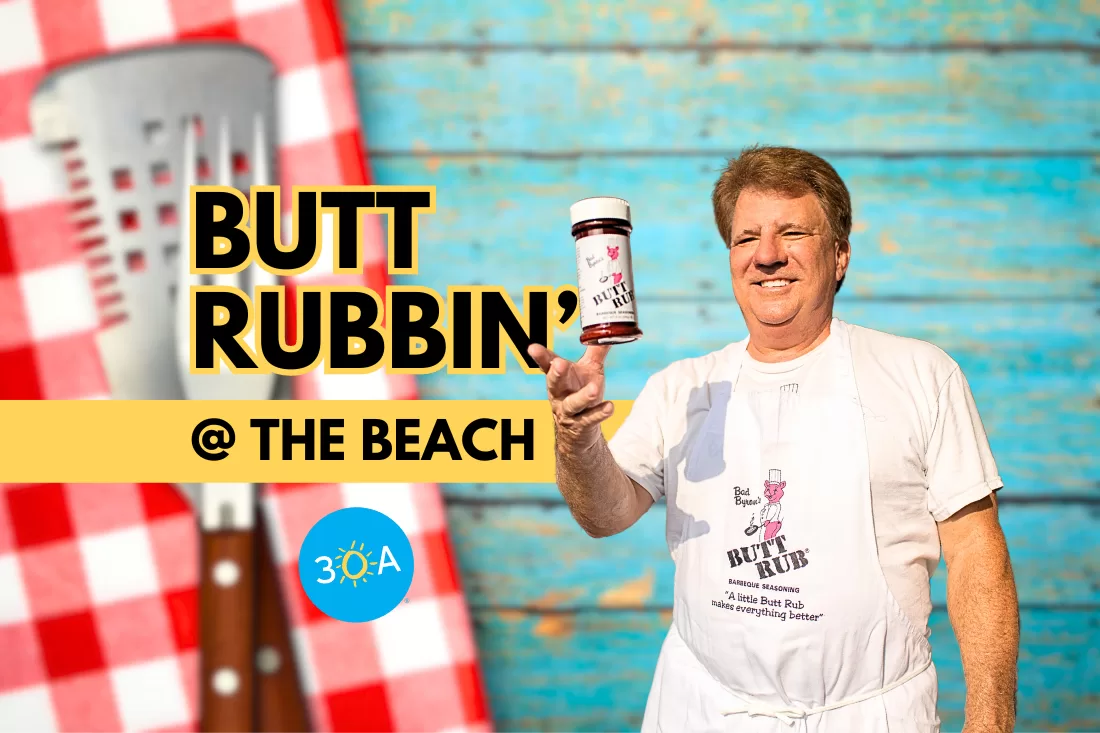Butt Rubbin’ @ the Beach: Byron Chism Finds Freedom and Happiness Rubbin’ Butts
BBQ brand born at the beach!
BBQ brand born at the beach!
 Photo by Guillaume LECHAT
Photo by Guillaume LECHAT One life. One love. Barbeque.
A resident of Santa Rosa Beach, Florida, Byron Chism has turned what was a passion fuelled by a helpful neighbor into a world championship-winning, million-dollar business empire.
The Texas native is the founder, president, and number one cheerleader for a company making a proprietary blend of spices and flavors available in supermarkets, independent retailers, and online across the nation and beyond.
Hungry to learn more about the man, the product, and the brand, I arrived at the company’s “world headquarters” in Freeport, Florida (population 6,283).
Welcome to Bad Byron’s Butt Rub.
The man behind one of the nation’s top-selling seasonings comes barrelling out to greet me, surrounded by a pack of dogs of all shapes and sizes – pampered pooches, motley-looking mutts, and rescue dogs.
After a quick tour of the facility, and a hello with some of the team (Susan Thomason, his operations manager, was employee number one back in 1997). We head towards the offices, only pausing to look at some framed pictures that tell the story of Byron’s Butt Rub.
On one wall is a set of photographs of Byron, his team, and a bunch of what look like barbeque aficionados from back in the day. There is also a copy of his very first invoice from Cocoon’s Deli in Seagrove Beach, a local retailer who first agreed to carry Byron’s new product.
On the other wall is a whiteboard with a chart recording product sales. It stretches back to those first-ever jars and bottles and rises precipitously to today, when Byron counts Kroger, Publix, and Costco amongst his customers.


“Growing up in rural Texas, I liked to ride dirt bikes. But I knew I had to follow a path to work and make some money too,” recalled Byron.
“In 1991, I’d just gotten out of college. I liked the beach, I liked cooking, I liked the 30A area, and I liked that we had some high-end restaurants. We had the only Culinary Institute of America-trained chef in the area, so for my first three years, I was at Bud and Alley’s in Seaside working under Chef Irv Miller. Knowing I was going to get that training was another reason I came to 30A.”
Byron quickly settled in the area.
“I was looking for a townhouse to rent, and at this one, the neighbor was cooking out there, passing me food. I was like, I think I like this neighborhood!”
The neighbor was Jim Norton.
“He was there from the start, always barbecuing and offering food all the time. We really hit it off. As we got to be friends and he taught me things, I was like, I’d like to get me a BBQ cooker.”
In the days before the internet and 24-hour shipping, Byron and Jim had to go and source the parts themselves to construct the BBQ pit of his dreams.
“Most people built their own equipment back then. It was before the barbeque boom,” said Byron. “It’s so much bigger now – just like they’ve discovered 30A, they’ve discovered barbecue.”

After a few years, Byron decided to take things further.
“I realized I liked cooking. I knew I had a knack for it, so I wanted to build a career,” he said. “I enrolled at the Culinary Institute of America in Hyde Park, New York. It was an amazing experience and great training. I loved every day of being up there.”
When Byron went up to New York, he had taken with him that barbecue cooker he and Jim had built.
“I started cooking for friends and other chefs up there, and they were going nuts over barbecue. I realized how much of a regional specialty it really was, the cuisine of the South, and that made me feel special about where I am from and about my culture,” Byron said.
“I was already in love with barbeque, and I really fell in love with it more while I was up there, but my path was still to be a chef, get my own place, and maybe incorporate some of my smoked meats into my menu,” he recalled.
Back in Florida, Byron went to work in various kitchens along Scenic Highway 30A.
“If I’m going to make a living cooking – I thought – I could cook all night and sell a $3 sandwich, or take a nice piece of fresh fish and make a $50 plate.”
Back then, tourism along the Emerald Coast was seasonal, ending in September, so to survive, you had to be creative.
“In the off-season, I always say we have more time than money, so I was creating my own way of doing things, making barbecue sauce, rub, and baked beans for friends, and putting them in mason jars.”
But there was something missing.

“We created the pig logo just to put on the jar. That’s when it came to life – when I put the pig on there. I was proud of my sauces and products. My friend Jim’s mother drew the pig. I wanted him to have a chef’s hat on because I’m a culinary guy, and we always cook pork butts, so I thought the bare butt was funny – a contrast between formal and informal. We called it Butt Rub – a rub for butts! What had started with personalizing the jar now looked like something you could buy in a store,” Byron said.
This was a transition moment.
“I would go into grocery stores and think, every product in here was created by someone, and I have as good or better of an education in food as they do, so why not? I felt like I could use my training to broaden my horizons into food products,” recalled Byron.
This was starting to look like a business.
With that new-found sense of self-esteem, Byron explored his options.
“I knew I had culinary training. I was a good barbecue cook. I looked at what was on the market, and in my mind, I thought, my products are as good, if not better, so let’s see what we can do here. We sold locally first and took baby steps.”
With those first products being available in local delis and retailers, the benefit of being in a resort town kicked in. People from across the region came to the beaches of 30A and sampled Byron’s products.
“They didn’t care as much about the beans and sauces, but they saw the Butt Rub, and that’s what lit them up,” said Byron.
“Everybody who visits has a friend or relative who cooks, so they bought it as a novelty. It’s a four or five-dollar purchase. They didn’t know the product, but they liked the pig and the name – they had a laugh about it.”
The packaging and the brand were a great introduction; it got people’s attention. But then they used it, and they loved it too.
“I remember getting a letter from one guy who said, “I got it as a joke, so I decided to cook with it for a joke, but we all loved it, so I guess the joke is on us!’”

By October of 1997, Byron was getting online orders from all over the country, too much to fulfill from his kitchen table in Santa Rosa Beach, so he partnered with a commercial manufacturer back in his home state of Texas, and from there, over the next few years, he took Butt Rub to independent grocery stores and supermarket chains.
“Doors were opening and people were calling us. The stores that carried it were doing well. It felt comfortable. I had gotten a taste of not working for someone else, the freedom to make my own decisions, and to call the shots. I forgot all about my chef dreams and just wanted this company to get off the ground,” said Byron.
But there was more.
“I knew it was funny and a laugh. I didn’t mind people having a good time with it, but I wanted to be taken seriously. I wanted someone to say: hey, the guy who created this is a barbecue champion, it’s the real deal. I wanted it to be credible with the grassroots here in the South because my competitors at the time were big businesses out of New Jersey and the like,” he said.
So how do you become a barbecue champion?
“I started going to competitions because that is where my customers were, sampling my product. But I thought: hey, I’m a pretty good barbecue cook, so why don’t I compete? So that’s what I did. I got my equipment and started practicing. In 1998, I started competing,” Byron said.
Byron was using the competitions as a way to promote Butt Rub. He launched his website buttrub.com at about the same time so people who enjoyed his barbecue could buy more.
Since those first events, Bryon has now competed and won competitions across 24 states and in 19 countries, winning national titles, grand championships, regional events, and specialty category competitions for his brisket, ribs, chicken, and of course, pork butts.

Byron’s success in barbeque competitions from 1998 to 2019 has been recognized by his peers, has seen him featured in Food Network TV shows, and has led to a trophy room at his Freeport world headquarters, which would put the Dallas Cowboys or the New York Yankees to shame.
Earlier this year, Byron learned he was to be inducted into the American Royal Association Barbeque Hall of Fame.
So, what’s next?
“Steady growth. We’re looking to introduce a range of Butt Rub snacks and explore other licensing opportunities, We have a seafood seasoning called Jubilee and Competition BBQ Sauce, which is now on the shelves of your local Publix,” explained Byron.
After more than 25 years in the Butt Rub business, is Byron still in his happy place?
“Heck yeah, I’m free as a bird – I don’t work for anyone else. I have a great team behind me running the show and selling it, I get to go to barbecue events all over the world and when I do return home, I’m coming back to the prettiest beaches in the country,” Byron said.
Byron has also bought a property in the Tennessee Valley – the center of the region’s barbecue community – which he calls the Butt Ranch.
“We host events and fundraisers for good causes, like the local animal shelter,” explained Byron. “It’s a place where barbeque fans can come together. We host events like Brisket and Bluegrass, and it has all evolved around a love for barbeque.”
Byron said he gets the biggest buzz knowing people are out there eating and enjoying his product. “That to me is the magic of barbecue, a great American tradition. I feel honored to be sharing my region’s cuisine and my culture with the world.
“I wear a Butt Rub t-shirt most days, not because I’m pimping the product, but when I’m out at the store, people say, ‘Hey, I cook with that!’ – and I ask, ‘What do you cook? Where do you get it from?’ I love those moments. I meet the people who have put us in business, and I share samples or merchandise with them. Those are the moments I live for.”

